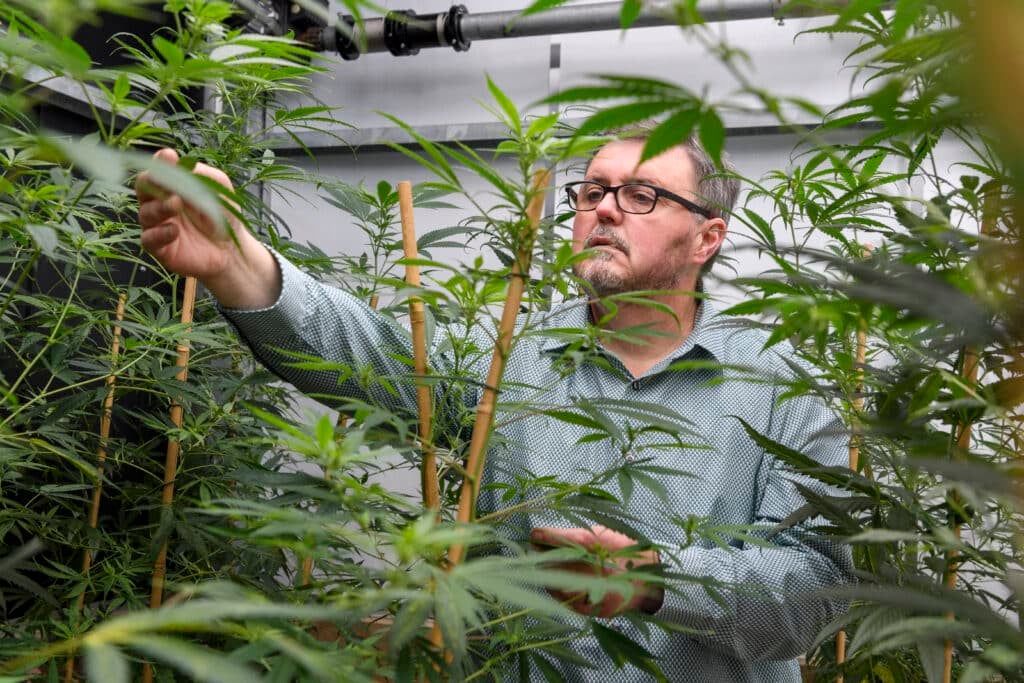Key Takeaways:
- The James Hutton Institute secures £350K from the Biotechnology and Biological Sciences Research Council (BBSRC) for medicinal cannabis research.
- An additional £867K in funding is allocated to projects focusing on light pulsing technologies in vertical farming and genetic tools for indoor-grown lettuce.
- Industry partner support totals £1.22M, bringing the total funding value for all projects to £2.4M.
- All three projects will be conducted at the newly-established Advanced Plant Growth Centre (APGC) in Invergowrie.
James Hutton Institute Awarded £2.4M for Pioneering Agricultural Research
The James Hutton Institute has been awarded £2.4 million in total funding to spearhead three groundbreaking research projects aimed at advancing medicinal cannabis, vertical farming technologies, and indoor-grown lettuce cultivation. The funding includes £350,000 from the Biotechnology and Biological Sciences Research Council (BBSRC) for medicinal cannabis research, and an additional £867,000 for two other projects focused on sustainable vertical farming and developing genetic tools for lettuce breeding. Support from industry partners brings the overall funding total to £2.4M.
The three projects will take place at the Institute’s newly-established Advanced Plant Growth Centre (APGC) in Invergowrie, which is part of the Tay Cities Regional Deal partnership. The APGC is supported by £45 million from the UK Government and £17 million from the Scottish Government and is designed to facilitate innovation across various agricultural sectors.
Focus on Medicinal Cannabis: Optimizing Cannabis Sativa for Pharmaceuticals
The first project, Exploiting Controlled Environments for the Development of Optimised Cannabis Sativa Phenotypes for Pharmaceutical Applications, will focus on using Controlled Environment Agriculture (CEA) technologies to standardize medicinal cannabis production. The research aims to develop consistent cannabis plant architectures that meet pharmaceutical standards, addressing the issue of varying cannabinoid profiles caused by geographical differences in cultivation. By optimizing growth conditions, the project seeks to maintain the UK’s leadership as the world’s largest producer and exporter of medicinal cannabis.
Derek Stewart, Director of the Advanced Plant Growth Centre, emphasized the importance of this research: “Medicinal cannabis is an increasingly important remedy and is becoming key in alleviating degenerative and neurodegenerative/dysfunctional diseases. We will play an important role in furthering pharmaceutical quality of these plants, reinforcing the UK’s importance on the world stage.”
Light Pulsing Technology in Vertical Farming for Sustainable Produce
The second project, Light Pulsing in Vertical Farming for Sustainable Fresh Produce (LightPuls-VF), will focus on improving efficiency and sustainability in vertical farming through the use of light pulsing technology. The research will explore how this technology can enhance the growth of herbs like basil, improving nutritional quality while reducing energy consumption. The project aims to boost food security by reducing the UK’s reliance on imported produce, while promoting sustainability and addressing climate change challenges.
“Research at the APGC will also see our team prove vital in the future food security and sustainability of this nation through our vertical farming project,” added Stewart. “We hope the success of these projects will be felt for many years to come.”
Indoor Lettuce Cultivation: Creating ‘Super-Lettuce’ for Urban Agriculture
The third project, Optimising Genetics by Management (GxM) Interactions to Enhance Productivity and Quality in Indoor Lettuce Cultivation, will focus on breeding varieties of lettuce that can thrive in low-light, urban environments. This project aims to enhance both yield and quality, paving the way for hyper-efficient urban agriculture. The research will explore genetic traits that improve performance under previously unviable conditions, contributing to the reduction of the industry’s carbon footprint and helping the UK achieve its sustainability goals.
Rob Hancock, Deputy Director of the Advanced Plant Growth Centre, who led the funding application for the GxM project, highlighted the project’s significance: “This project will allow our scientists to make exciting advances with lettuce in urban environments by researching low light conditions and developing new varieties that will thrive in these conditions.”
James Hutton Institute Latest News
Co-Leads £38M National Alternative Protein Innovation Centre (2024/08/29)
The James Hutton Institute is leading the National Alternative Protein Innovation Centre (NAPIC), a £38M initiative in the UK to develop sustainable alternatives to animal proteins. The centre, funded by a £15M grant from the Biotechnology and Biological Sciences Research Council (BBSRC) and Innovate UK, will explore protein sources from plants, fungi, algae, and lab-grown meat. The aim is to integrate these alternatives into mainstream diets and reduce the environmental impact of food production. Animal agriculture contributes to up to 20% of global greenhouse gas emissions, and with the global population expected to reach 10 billion by 2050, the demand for protein is set to rise. NAPIC will focus on developing alternative proteins from non-animal sources, such as cereals, legumes, fungi, algae, and lab-grown meat, which offer a lower carbon footprint and require fewer resources.


